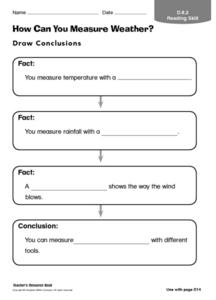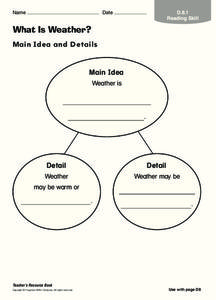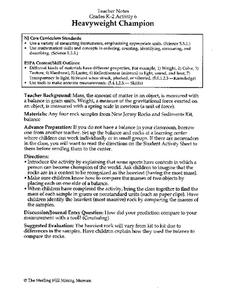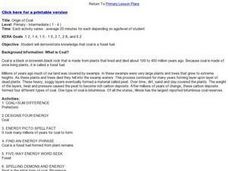Curated OER
How Can You Measure Weather?
In this measuring weather worksheet, students fill in the blank of 4 statements about the different tools scientists use to measure weather. This worksheet is a graphic organizer.
Curated OER
What is Weather?
In this weather worksheet, students complete a graphic organizer by writing in 1 main idea and 2 supporting details describing what makes up the weather.
Curated OER
How Rocks Form and Change
In this rocks worksheet, students will complete a graphic organizer by filling in the different ways rocks are formed and changed.
Curated OER
How Does the Sun Affect the Earth?
In this sun worksheet, students brainstorm the different ways the sun affects the Earth. This worksheet is a graphic organizer.
Curated OER
How Can You Use Tools to Observe?
In this observation tools worksheet, students will compare how a lens, a ruler, and a balance can help them learn about the properties of objects. This worksheet is a graphic organizer.
Curated OER
How Does Weather Change?
In this weather worksheet, students will fill in the blank of 5 statements about how weather changes over time. This worksheet is a graphic organizer.
Curated OER
How Does the Moon Move?
In this moon worksheet, students will fill in the blank of 6 statements relating to how the moon rotates around the Earth including the phases of the moon.
Curated OER
What Causes Weather?
In this weather worksheet, students will write down 1 main idea about what causes weather. Then students will write in 2 supporting details in this graphic organizer.
Curated OER
What a Wonderful World!
In this Leonardo da Vinci worksheet, students read that Leonardo da Vinci was a curious man and always questioned things in the world around him. Students then create questions of their own about animals, art, science and history. The...
Curated OER
Weather
In this vocabulary worksheet, students find ten words about the weather in a thirteen by twelve letter word search. Words include types of storms, such as blizzard as well as more general terms such as sunshine.
Curated OER
Shadow Know-How
In this fill in the blank worksheet, pupils identify the names of fourteen constellations by analyzing their outlines in shadow
pictures.
Curated OER
Trash To Treasure
In this environmental worksheet, learners learn about reusing trash and making crafts and useful items instead of throwing it into a landfill. Students study 15 pictures of crafts and list as many trash items as they can find.
Curated OER
Stars (Writing a Booklet)
In this writing worksheet using KWL, students write three mini-pages about stars. Students then cut out the pages and make them into a little book.
Curated OER
The Water Cycle
In this water cycle worksheet, students examine two boxes on the page. In one box, students name the 4 parts of the water cycle. In the second box, they draw a picture of the water cycle.
Curated OER
The Weather Forecast
Students observe a daily paper to see the temperature forecast looking at a paper thermometer with today's predicted temperature colored in. They predict today's temperature, and paste the second color on the same thermometer to show...
Curated OER
Weather Mobile
Students color the lightning part of the thunder cloud and then cut out the pattern. They then cut out the cloud pattern and put cotton onto it with glue. They then fold a piece of paper several times to create a snowflake to which they...
Curated OER
The States of Water
Pupils observe water changing states from a solid to a liquid to a gas.
Curated OER
Evaporation
Pupils break into small groups with four or five students per group. Each is given a styrofoam plate on which they write their group name on and 2 teaspoons of warm water. They place their plate on a paper towel somewhere in the room and...
Curated OER
Heavyweight Champion
Pupils identify what mass is and how to measure an object with a balance in gram units. Students identify weight and how to measure with a spring scale in units of force. Pupils compare the masses of two objects by placing each on one...
Curated OER
Growing Tomatoes
Second graders investigate the growth of tomatoes. They plant grape tomatoes and observe them. They write in a journal and take digital pictures of their tomato plants. They create bar graphs to tally the progress of their plants and...
Curated OER
Water, Water Everywhere
Studetns view a terrarium with water droplets on the wals. They discuss the ways the water could have got onto the wall of the terrarium. Students design an experiment to duplicate the process. They describe the patterns form their data...
Curated OER
Adopt a Geographic News Story
Young scholars explore geography and the environment by reading the news. They discuss why it is important to follow the news. Students adopt a geographic news story, research the topic, and design posters to illustrate the story.
Curated OER
Sampling Rocks
Students will collect and analyze a sample of rocks from the schoolyard. They will array the collected rocks by characteristics such as size, weight, and color, to see if any generalizations can be made about the types of rocks that can...
Curated OER
What is Coal?
Students receive instruction to answer the question "What is coal?". They then participate in several puzzles and problems to explore the subject of coal. They solve addition and subtraction problems and match letters with the letter...

























